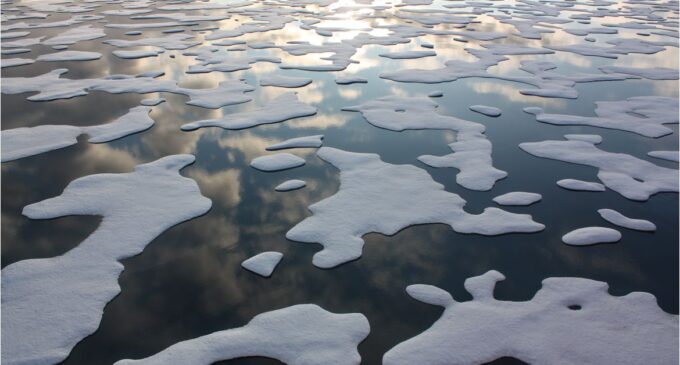FACT CHECK: No, short term data can’t determine overall decline of arctic sea ice

A Facebook post has claimed that arctic ice is neither declining nor disappearing.
Attached to the post was an article showing a graph for arctic ice for mid-April through mid-May in 2007, 2018, 2021 and 2023.
The article was titled: “Arctic Ice Plentiful Mid May 2023”.
The graph indicated that the area of the ocean covered by a certain percentage of ice is higher in 2023 than in the other listed years and similar to the 17-year average.
“The ice is not disappearing,” says the Facebook post, which claimed that data for the month of April and May 2023 shows that the arctic sea ice is not declining.
RECORDS SHOW THAT SEA ICE IS DECREASING
According to the National Aeronautics and Space Administration (NASA), a US agency responsible for aeronautics and space research, the volume of ice has significantly reduced.
The US agency has also reported that the average age of sea ice is becoming shorter.
Citing far back as the late 1970s, when satellite recording commenced, NASA says most of the ice covering the arctic ocean at that time was greater than 4 years old.
Presently, most of the ice covering the ocean is first-year ice, formed during winter, and very unlikely to withstand a single melt season during summer.
Also, data released by the National Snow and Ice Data Centre, explains that the size of the arctic sea has declined since the 1970s.
Although the 2023 sea ice extents were slightly higher for the period under review – mid-April through mid-May than in 2007, 2018 and 2021 – just like the Facebook post stated. However, the sea ice varies by year and season despite that it is experiencing an overall decline.
Sea ice extent is the area of ice that covers the arctic ocean at a given time.
Climate experts have also reported that compiling or analysing short-term data is inadequate for making accurate climatological inferences.
Olusola Ayantobo, a hydro-climatologist and research associate at China’s Tsinghua University, had told TheCable that “station data shouldn’t be used to predict climate change conditions over a particular region”.
The climate expert added that: “Short-term datasets can only be used for weather prediction while a long dataset is appropriate for climate change predictions.”
Experts say that though two decades might look quite long, however, it is short when studying long-term climate trends.
MELTING SEA ICE AGGRAVATES GLOBAL WARMING
The albedo effect explains why the rapid melting of sea ice aggravates climate change. The theory says that the bright surface of the ice reflects solar energy, which has a cooling effect. Also, ocean water, which is darker, absorbs more solar energy, causing more warming.
The loss of sea ice warms the arctic, hence, contributing to a phenomenon referred to as arctic amplification, a process through which the arctic warms at a faster rate than lower latitudes.
VERDICT
The claim that the sea ice is neither melting nor disappearing is false.
Long-term studies dating back to 1970 show that arctic sea ice has declined significantly. Climate experts have also warned that only long-term data analysis can provide accurate inferences when studying climate trends.
This fact check was produced by TheCable with support from Code for Africa’s PesaCheck, International Fact-Checking Network, and African Fact Checking Alliance network.












There are no comments at the moment, do you want to add one?
Write a comment